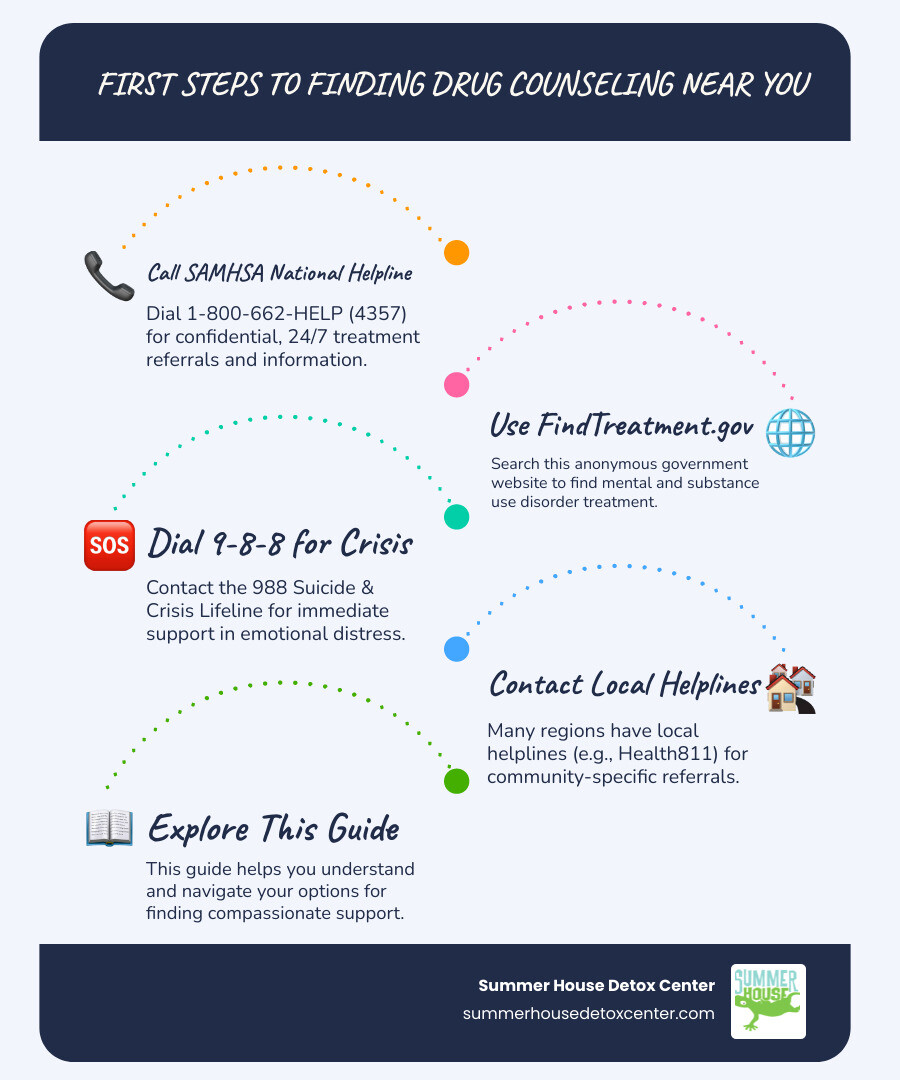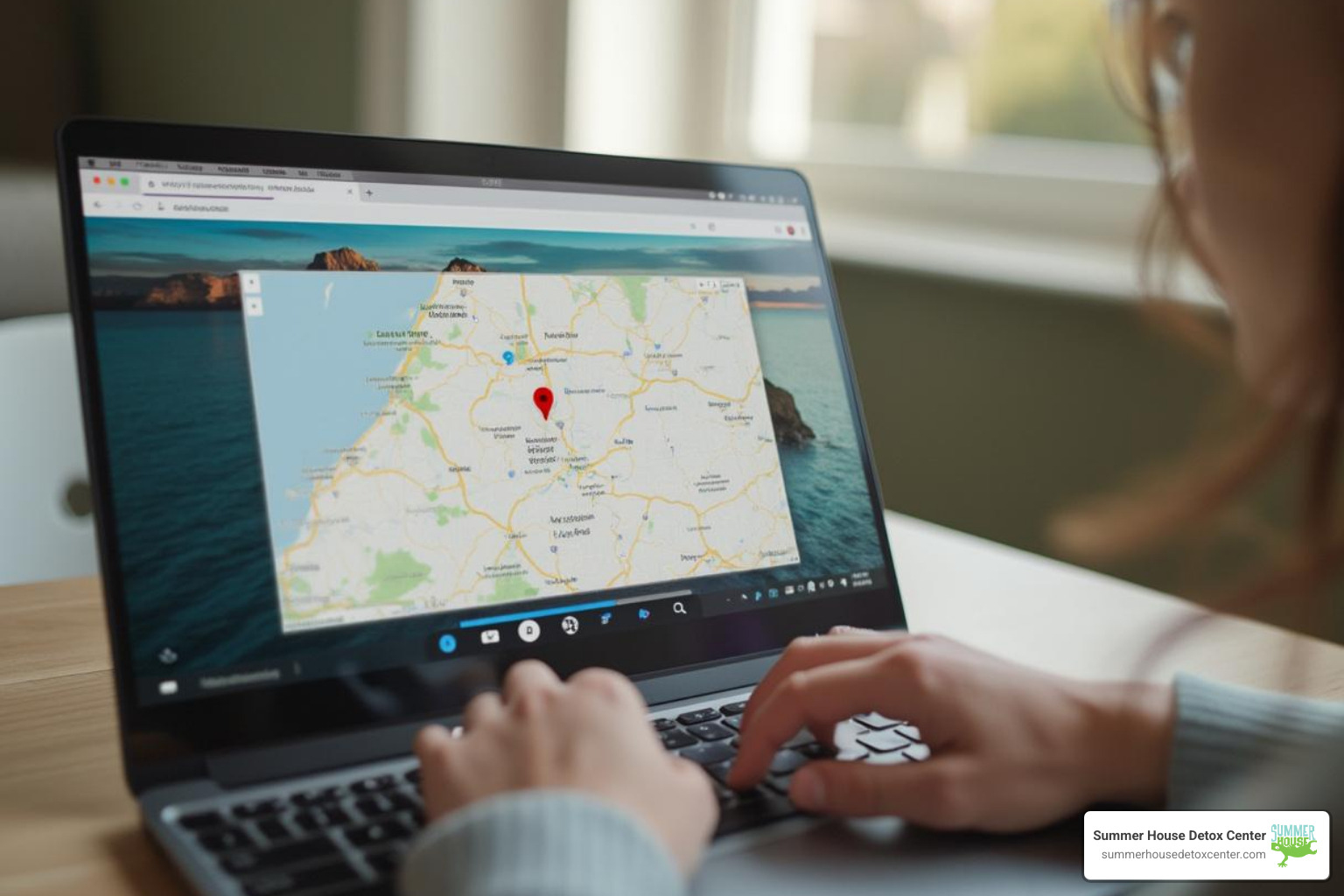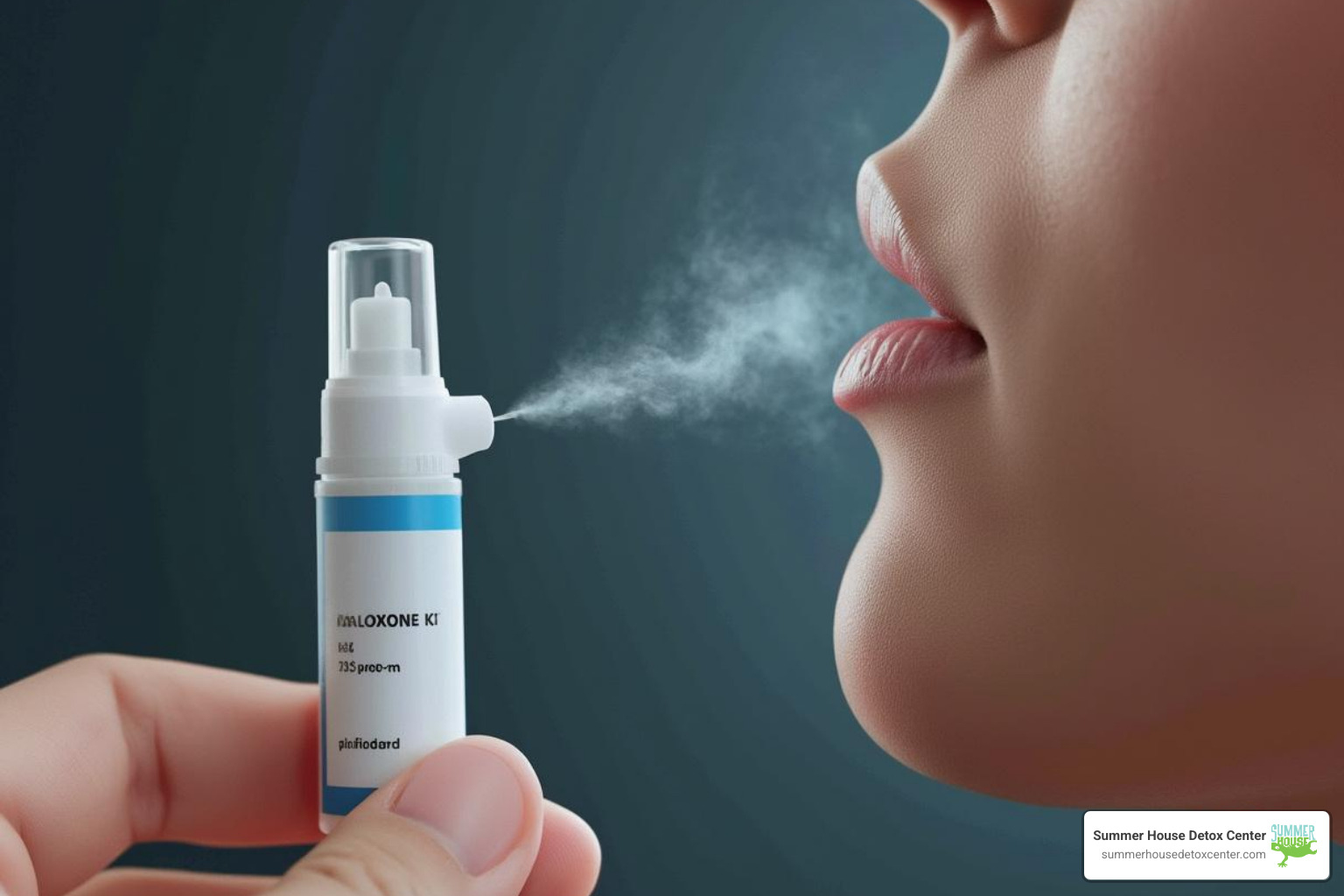Starting Your Journey: Your Guide to Drug Counseling Near You
Searching for drug counseling near me is a sign of incredible strength. Admitting you might have a problem is often the toughest part of recovery, but you don’t have to carry this burden alone. As one expert put it, “Recovery is possible.”
For immediate help and to quickly find drug counseling services near you:
- Call SAMHSA’s National Helpline: Dial 1-800-662-HELP (4357) for confidential treatment referrals and information, available 24/7.
- Use FindTreatment.gov: This government website offers a confidential and anonymous way to find treatment for mental and substance use disorders across the United States.
- Dial 9-8-8: If you or someone you know is in emotional distress or suicidal crisis, the 988 Suicide & Crisis Lifeline provides immediate support.
- Contact a Local Helpline: Many regions have local helplines like Health811 or ConnexOntario (in Canada) that offer 24/7 support and referrals to community services.
This guide will help you steer your options and find compassionate, experienced support close to home.

Simple guide to drug counseling near me terms:
What is Drug Counseling and Why is it Essential?
If you’re struggling with a substance use disorder, you’re experiencing a medical condition that affects your brain, choices, and every part of your life. It’s far more than a “bad habit” and requires professional care. Taking the first step toward recovery can feel daunting, but admitting there’s a problem is brave, and reaching out for help is a powerful next move.
This is where professional drug counseling, also known as addiction therapy, comes in. It’s a vital part of the recovery journey, providing a safe, structured, and supportive space. Here, you can get to the root causes of your substance use, learn healthy coping skills, and build a strong foundation for long-term sobriety.

Defining Drug Counseling and the Role of a Counselor
Drug counseling involves working with a trained professional, an addiction counselor or therapist, whose main goal is to help you heal and stay free from addictive substances. A good counselor creates a safe space built on trust, where you can share your struggles without judgment. They’ll help you identify triggers and develop strategies to avoid or manage them.
Through various therapy approaches, your counselor will guide you in changing habits and thought patterns that fuel addiction, which is key for relapse prevention. It’s important to know that “drug abuse” is now more accurately called substance use disorder, reflecting a medical, less judgmental understanding. An addiction counselor helps you break free from the compulsive cycle of addiction. You can explore more about addiction here: What is Addiction?
The Transformative Benefits of Professional Guidance
The benefits of professional drug counseling near me go far beyond stopping substance use. It’s about rebuilding a meaningful life with professional support.
One of the deepest benefits is a big improvement in mental health. Since about half of people with a substance use disorder also struggle with mental health issues, counseling is crucial for addressing underlying problems like past trauma. Working through these conditions can lead to greater emotional stability.
Counseling also gives you tools to rebuild relationships with yourself and others. You’ll learn better communication skills, process past hurts, and mend trust. It empowers you to gain control over your life again, filling you with hope and gratitude. Our aim is to help you find your true potential and achieve a life free from addiction. Learn more about breaking free here: Breaking the Chains of Addiction: Why Rehab is the Key
Navigating Your Options: Types of Drug Counseling and Treatment Settings
Finding the right drug counseling near me is crucial because recovery journeys are deeply personal. There is no single “best” way to heal; effective support is always customized to your unique background, challenges, and goals.
Exploring Different Therapy Models
Counselors use various helpful therapy models to help you build a stronger, healthier life.
Cognitive Behavioral Therapy (CBT) is a common and effective therapy that helps you spot and change unhelpful thoughts and actions contributing to substance use. It teaches you to handle cravings and tough situations by changing how you react to them.
Dialectical Behavioral Therapy (DBT) is another powerful approach, especially for those with co-occurring mental health challenges. It helps you balance feelings and thoughts to avoid unwanted behaviors by teaching skills like mindfulness, distress tolerance, emotional regulation, and interpersonal effectiveness.
Motivational Interviewing (MI) is a collaborative approach where your counselor acts as a guide, helping you explore your own reasons for wanting to change and strengthening your commitment to recovery.
12-Step Facilitation (TSF) encourages you to join programs like Alcoholics Anonymous (AA) or Narcotics Anonymous (NA). These programs offer incredible peer support and a roadmap for recovery.
Beyond these models, you’ll likely participate in different settings. Individual therapy is a one-on-one space to openly discuss personal issues, trauma, and triggers in a private setting, providing personalized strategies.
Group therapy is also incredibly powerful. Sharing experiences with others who understand provides a strong sense of community and mutual support. As one person wisely put it, “Sometimes just knowing you are not alone can make a difference in group therapy.” It’s a safe place to learn from others and practice new coping skills.
Family Therapy plays a vital role, as addiction touches everyone in a family. This therapy brings loved ones into the healing process to mend relationships, improve communication, and build a supportive home environment for long-term recovery. It’s a way to heal together. You can learn more about its critical role here: The Role of Family Therapy in Substance Abuse Treatment
Choosing the Right Treatment Setting for Your Needs
The setting where you receive counseling is as important as the therapy type. Different settings offer different “levels of care” based on the severity of the substance use disorder and your personal needs.
For many, the first and most crucial step is medically supervised detox. This ensures you can safely and comfortably withdraw from substances, with medical professionals managing any difficult symptoms.
After detox, you might transition to inpatient or residential rehab. This means living at a treatment facility for a set period, offering an immersive, structured environment away from daily triggers. It’s an excellent choice for those who need intensive, round-the-clock care.
A Partial Hospitalization Program (PHP), or “day treatment,” offers many hours of daily therapy and support, similar to inpatient care, but you return home at night.
Intensive Outpatient Programs (IOPs) are a step down from PHP, with fewer hours of therapy each week. This allows you to integrate back into daily life while still receiving significant support.
Outpatient Programs (OPs) are the least intensive, with weekly or bi-weekly counseling sessions while you live at home. This is often great for those with a strong support system or as a step-down from more intensive care.
To help you visualize the differences, here’s a quick comparison:
| Feature | Inpatient/Residential Treatment | Outpatient Programs (OP/IOP/PHP) |
|---|---|---|
| Environment | Live at the facility, 24/7 supervised, structured environment. | Live at home, attend sessions during the day/evening. |
| Intensity | Highest level of care, comprehensive therapies, daily schedule. | Less intensive, varying frequency (IOP/PHP more intensive than OP). |
| Medical Support | Often includes medically supervised detox, on-site medical staff. | May offer medical support, but detox usually occurs elsewhere. |
| Focus | Immersive, removes individual from triggers, focuses solely on recovery. | Integrates treatment with daily life, work, or school. |
| Ideal For | Severe addiction, co-occurring disorders, relapse history, unsafe home environment. | Moderate addiction, strong support system, need for flexibility. |
At Summer House Detox Center, we understand the importance of a safe start. We specialize in medically supervised detox, providing compassionate care as you begin your journey. Learn more about our approach: Drug and Alcohol Detox in Miami, FL
How to Find Drug Counseling Near Me
When you’re ready to find drug counseling near me, it can feel overwhelming. However, many caring resources are available to guide you, and we’re here to simplify the process.

Online Directories and National Helplines
The internet is a powerful tool for exploring your options and connecting with professionals from the comfort of your home.
A reliable place to begin is SAMHSA’s National Helpline (1-800-662-HELP). This free, confidential, 24/7 helpline provides information and referrals to treatment centers, support groups, and local organizations.
Another excellent government resource is FindTreatment.gov. This website is a large database for finding mental health and substance use disorder treatment across the United States.
Beyond government sites, online directories like Psychology Today have comprehensive databases where you can search for therapists by location, specialization, and insurance.
Using search terms like “drug counseling Miami FL” can also narrow down local options. Also, consider Online Therapy Platforms. Research shows online video counseling can be as effective as in-person sessions for substance use disorders. They offer flexibility and convenience, which can be a more comfortable option if you’re hesitant about seeking help in person. For more tips, check out our guide: Finding the Right Detox Centers in South Florida: What to Look For
Local and Community Resources
Don’t overlook the valuable resources in your own community.
Your Primary Care Physician is a great starting point. Knowing your health history, they can be a trusted guide, discuss treatment paths, and provide doctor referrals to local addiction specialists.
Community Mental Health Centers often receive public funding, offering counseling that may be free or on a sliding scale based on your income. They frequently provide “integrated care,” addressing both substance use and mental health concerns together.
Local Hospital Programs are another avenue. Many hospitals offer both inpatient and outpatient addiction treatment programs and can be a crucial resource for emergency mental health support.
Your Local Health Departments can provide information on local support services, including resources like naloxone kits to reverse opioid overdoses and other harm reduction strategies.
Finally, local Helplines and Support Hubs, like Health811 or ConnexOntario (in Canada), offer 24/7 advice and referrals to local services. Some areas have specialized hubs that offer a wide range of help for complex needs.
Exploring these local options can help you find accessible support in your neighborhood. If you’re in South Florida, we’re here to help you find resources, including our own specialized care: Drug Rehab Centers in South Florida
Key Considerations When Choosing a Drug Counselor
You’ve taken the brave step to look for help. Now, it’s time to find the right person or program to walk alongside you. Choosing a drug counselor is a deeply personal decision, like finding a trusted partner who makes you feel safe, understood, and ready to grow.
Credentials, Specializations, and Finding the Right Fit
When searching for drug counseling near me, you want to connect with someone who is both skilled and a good personal fit.
First, look for their credentials and qualifications. Check that they are licensed and certified in your state, which shows they’ve had the proper training and follow best practices in addiction counseling.
Next, consider their experience and specialization. Counselors often have specific experience with certain substances, age groups, or those dealing with trauma. Ask if they have expertise with needs similar to yours.
Perhaps most important is the therapeutic relationship—the connection you feel with your counselor. This bond of trust is the foundation for feeling safe enough to share openly. We recommend scheduling initial calls with a few counselors. Ask yourself: Did I feel heard and comfortable? Finding the right fit may take time, but it’s a crucial investment in your well-being. For more insights into what makes a treatment center effective, explore: Best Drug Treatment Centers
Addressing Co-Occurring Disorders and Specialized Needs
Addiction rarely travels alone. It’s common for people with a substance use disorder to also deal with mental health challenges like anxiety, depression, or trauma. These are called co-occurring disorders (or dual diagnosis).
A great drug counseling program will integrate treatment for both addiction and any co-occurring mental health issues. Treating one without the other can hinder long-term recovery. Look for programs that offer a comprehensive assessment and specialized therapies like Cognitive Behavioral Therapy (CBT) or Dialectical Behavioral Therapy (DBT).
Beyond mental health, some people have other specialized needs. For example, there are programs designed for youth services, veterans, and first responders. LGBTQ+ affirming care provides a safe and understanding environment. Culturally sensitive programs can integrate traditional healing practices. Finding a program that understands and addresses all these intertwined parts of your life is key to a holistic and lasting recovery. Learn more about integrated care: Dual Diagnosis Rehab
Affordability and Overdose Prevention
It’s understandable to have concerns about the cost of drug counseling near me, but financial worries shouldn’t be a barrier to getting help. Many affordable or free options are available. It’s also wise to be aware of life-saving measures like naloxone for overdose prevention.

Are there free or affordable options for drug counseling near me?
Yes, absolutely! While private treatment centers offer personalized care, many excellent free and affordable options are available.
Many regions offer government-funded programs. In the U.S., state and local health departments often fund community services that are low-cost or free, based on your income.
Insurance coverage is another key area. Most private insurance plans cover addiction treatment. Call your provider to understand your specific benefits; many treatment centers, including ours, can help you verify them. If you don’t have insurance, some centers offer payment plans or out-of-pocket options to ease the financial burden.
You’ll also find counselors and clinics that offer services on a sliding-scale fee, meaning the cost is adjusted based on what you can afford.
Many non-profit organizations also provide affordable or free counseling services, supported by grants and donations.
Beyond formal counseling, peer support groups offer invaluable, free support and community. While they aren’t professional counseling, they are a fantastic complement to it. Some well-known examples include:
- Alcoholics Anonymous (AA)
- Narcotics Anonymous (NA)
- SMART Recovery
- LifeRing Secular Recovery
- CAPSA Peer Support
Financial barriers should never stop anyone from getting life-saving treatment. If you’re concerned about costs, reach out to providers to ask about payment options. Understanding the realities of addiction can help you make informed decisions: Hard Facts: Drug Addiction
Overdose Prevention: What is Naloxone and Where to Find It
When exploring drug counseling near me, it’s also vital to know about overdose prevention, especially for opioid use disorder. Naloxone (brand name Narcan) is a life-saving medication that can rapidly reverse an opioid overdose. It works by blocking the effects of opioids on the brain, helping a person start breathing again.
Naloxone kits are increasingly available, often for free from pharmacies, public health units, and community organizations across the U.S. and Canada. These locations may also offer training on how to use it. Having naloxone on hand is a critical harm reduction strategy that can save a life.
For additional support, services like the National Overdose Response Service (NORS) can provide confidential help. It’s also worth understanding Medication-Assisted Treatment (MAT), an evidence-based approach using medications with counseling to manage opioid use disorder. Naloxone is a vital part of this broader strategy. Learn more about this comprehensive approach: Understanding Medication-Assisted Treatment
Frequently Asked Questions about Drug Counseling
It’s normal to have questions when exploring drug counseling. This step shows courage, and we’re here to help you understand what to expect when looking for drug counseling near me.
How long does drug counseling usually last?
The honest answer is: it depends on you! There isn’t a one-size-fits-all timeline for drug counseling. Several factors influence the duration, including the severity of substance use, co-occurring mental health challenges, home support, and personal progress. Longer-term support is often beneficial for more severe addiction. Studies show that longer treatment (60 days or more) can lead to better outcomes for lasting sobriety, especially when mental health is also involved.
Your journey might start with an intensive program, like inpatient care, for a few weeks to a few months, then transition to outpatient counseling for several months or even years. The goal is to give you the tools for a lasting recovery, and your counselor will adjust the plan to your evolving needs. To learn more about continued support, check out our insights on Aftercare Drug Rehab.
Is drug counseling confidential?
Yes, absolutely! Confidentiality is a cornerstone of drug counseling, creating a safe, trusting space for you to share openly. In the United States, your privacy is protected by federal laws like HIPAA (Health Insurance Portability and Accountability Act). This law sets strict rules for handling sensitive health information. Your counselor and facility are legally required to follow these rules, ensuring your conversations and records remain private. This trust is vital for the healing process.
However, there are rare, legally mandated exceptions, such as immediate risk of harm to yourself or others, suspected child or elder abuse, or a court order. Your counselor will explain these limits to you, and your written consent is required to share information with others.
Can I be forced to go to drug counseling?
While the most effective treatment is voluntary, there are situations where counseling is mandated. One common scenario is court-ordered treatment. Following legal issues like a DUI, a court might require you to attend counseling as part of sentencing or probation, often involving specific assessments and follow-up.
Family and friends may stage an intervention, using their support to strongly encourage someone to seek help. An employer mandate might also require treatment following a violation of workplace substance use policies.
Even when mandated, the decision to engage in recovery rests with you. At Summer House Detox Center, we believe in voluntary treatment and empowering patients to take ownership of their recovery. Choosing to fully participate is what leads to lasting change.
Your Next Step Towards Recovery
We hope this guide has brought you clarity as you’ve explored drug counseling near me. Recovery is a real possibility, and help is available.
Taking the first step—admitting you might have a problem—is an act of incredible courage. The next brave step is to reach out for support. You don’t have to carry this burden alone.
At Summer House Detox Center, we understand the complexities of addiction and know a personalized approach is key. Located in Miami, FL, our in-patient detox facility is designed for your comfort and dignity. We offer medically supervised detox, ensuring your safety during this crucial first phase.
Our dedicated team, many of whom are in recovery themselves, provides unwavering, judgment-free support. We are committed to helping you begin your journey to a life free from substance use. There’s no shame here, only compassionate care and a genuine commitment to helping you uncover your true potential.
Ready to take that next step? We’re here to help you start your journey to optimal recovery.
Explore our personalized treatment plans to start your journey to optimal recovery.

